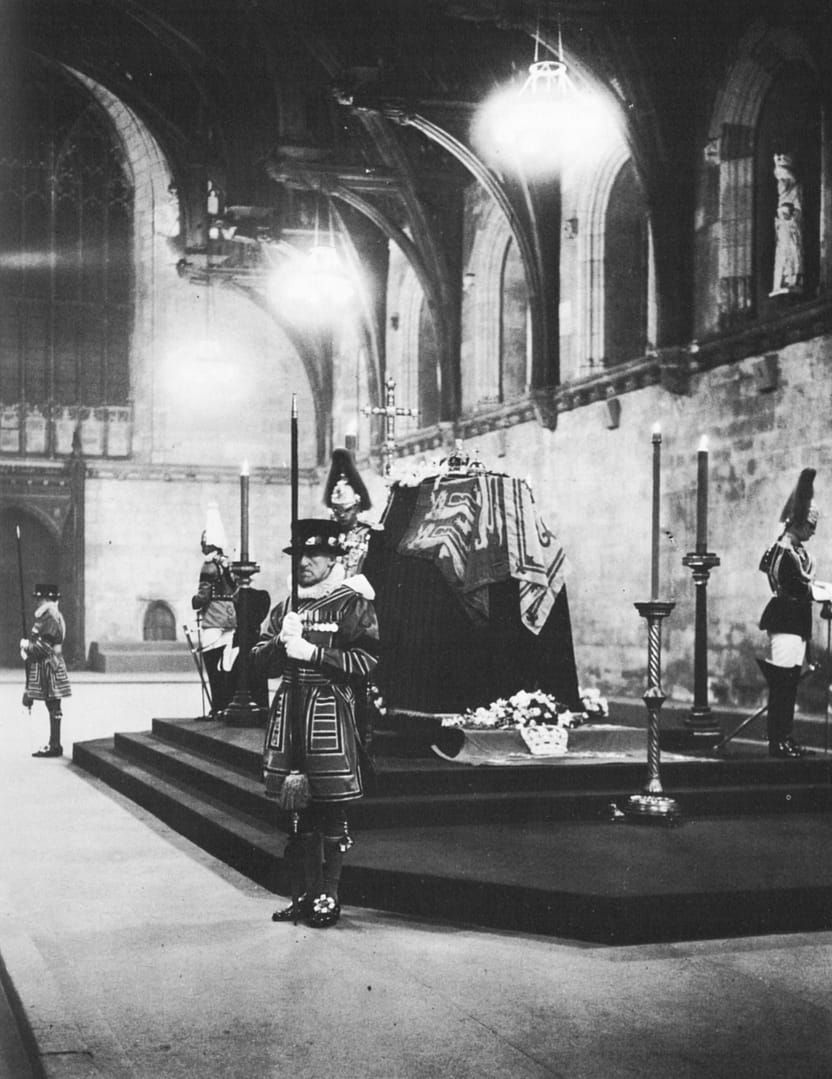Dimbleby became the principal BBC commentator at State occasions both for radio and for television. His choice of words, his measured delivery, were never more attuned with the feelings of his listeners than when he described the Lying-in-State of King George VI to a sorrowing nation:
It is dark in New Palace Yard at Westminster tonight. As I look down from this old, leaded window I can see the ancient courtyard dappled with little pools of light where the lamps of London try to pierce the biting, wintry gloom and fail. And moving through the darkness of the night is an even darker stream of human beings, coming, almost noiselessly, from under a long, white canopy that crosses the pavement and ends at the great doors of Westminster Hall. They speak very little, these people, but their footsteps sound faintly as they cross the yard and go out through the gates, back into the night from which they came. They are passing, in their thousands, through the hall of history while history is being made. No one knows from where they come or where they go, but they are the people, and to watch them pass is to see the nation pass.
It is very simple, this Lying-in-State of a dead King, and of incomparable beauty. High above all light and shadow and rich in carving is the massive roof of chestnut, that Richard II put over the great Hall. From that roof the light slants down in clear, straight beams, unclouded by any dust, and gathers in a pool at one place. There lies the coffin of the King. The oak of Sandringham, hidden beneath the rich golden folds of the Standard; the slow flicker of the candles touches gently the gems of the Imperial Crown, even that ruby that King Henry wore at Agincourt. It touches the deep purple of the velvet cushion and the cool, white flowers of the only wreath that lies upon the flag. How moving can such simplicity be. How real the tears of those who pass and see it, and come out again, as they do at this moment in unbroken stream, to the cold, dark night and a little privacy for their thoughts.
Who can know what they are thinking? Does that blind man whom they lead so carefully down the thick carpet sense around him the presence of history? Does he know that Kings and Queens have feasted here and stood their trial and gone to their death? And that little woman, with the airman by her side – does she feel the ghosts that must be here in the shadows of the Hall? The men and the women of those tumultuous days of long ago, of Chaucer, Essex, Anne Boleyn, Charles and Cromwell, Warren Hastings and those early Georges? Or does she, and do all those over seventy thousand of the nation, who will have passed through this day alone, think only of the sixth George; the faithful George who lies there now, guarded by the living statues of his officers and Gentlemen at Arms and Yeomen of the Guard. For in the few seconds that are all that can be given to each subject to pass by his dead King, there is colour and splendour and loveliness beyond compare.
I thought when I watched the Bearers take the coffin into this Hall yesterday that I had never seen a sight so touching. The clasped arms of the Grenadiers, the reverent care with which they lifted and carried their King. But I was wrong. For in the silent tableau of this Lying-in-State there is a beauty that no movement can ever bring. He would be forgiven who believed that these Yeomen of the Bodyguard, facing outwards from the corners of the catafalque, were carven statues of the Yeomen of the Tudor Henry’s day. Could any living man, let alone a white-bearded man of eighty, be frozen into this immobility? The faces of the two Gentlemen at Arms are hidden by the long, white helmet plumes that have fallen about them like a curtain as they bowed their heads. Are they real, those faces, or do the plumes conceal two images of stone? And the slim, straight figures of the officers of the Household Brigade, hands poised lightly on their arms reversed, what sense of pride and honour holds their swords so still that not one gleam of light shall be reflected from a trembling blade? Never safer, better guarded lay a sleeping King than this, with a golden light to warm his resting place and the muffled tread of his devoted people to keep him company. They come from a mile away in the night, moving pace by pace in hours of waiting, come into the silent majesty of the scene and as silently leave again.
Two hundred thousand may come to Westminster this week, but for every one of them there will be a thousand scattered about the world who cannot come, but who may be here in their thoughts at this moment. They will know that the sorrow of one man, one woman or one child that passes by the King in London is their sorrow too.
For how true tonight of George the Faithful is that single sentence spoken by an unknown man of his beloved father: ‘The sunset of his death tinged the whole world’s sky.’

